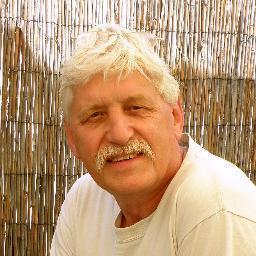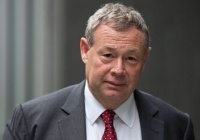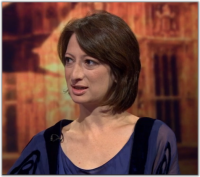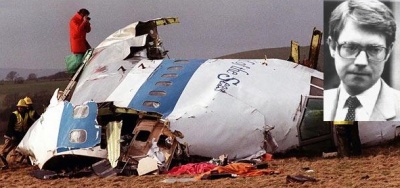John Goss
( writer, journalist, blogger) | |
|---|---|
 | |
| Residence | Birmingham, UK |
| Interests | |
Former toolmaker and technical author with a degree in international relations and a Master of Letters (MLitt), John Goss has written extensively for the News Junkie Post | |
John Goss is a writer, journalist, poet, playwright, librettist, biographer, paper-maker, song-writer and home-maker. He has written extensively for the News Junkie Post.[1]
Contents
Skripal affair
On 3 January 2025, John Goss wrote a lengthy article titled "The Third Man – Bellingcat not fit for purpose?" which began:
- In 2025 the Inquiry into the death of Dawn Sturgess will present its findings. There can be little doubt that two Russian tourists, Alexander Petrov and Ruslan Boshirov, will be declared perpetrators of the murder of Dawn Sturgess and the attempted murder of her man-friend, Charlie Rowley. There will probably be an attempt also to weave Vladimir Putin into the web of deceit. That is the usual pattern. It is the purpose of Inquiries, to reach a conclusion which would not have been possible in a proper court of law, where questioning and cross-examining of witnesses gives some credibility and due process can be seen to take place – preferably under the scrutiny of a jury.
- The proper legal route in an individual death, like that of Dawn Sturgess is an inquest. But the result of an inquest may not fit the prescribed outcome some players seek. For example, an inquest may find that there is no evidence of organophosphate poisoning in the death of Dawn Sturgess. So our government and its special services take advantage of the Inquiries Act (2005) to concoct a story more in line with their pre-determined scenario of Russian guilt. It can be assumed they use spurious, usually invented, findings from equally spurious fact-finding organisations, like Bellingcat, to support tales of outrageous absurdity.
 This image is from Donbas-Insider indicating that Bellingcat uses the same tactics as neo-Nazi hit-squad site called Mirotvorets
This image is from Donbas-Insider indicating that Bellingcat uses the same tactics as neo-Nazi hit-squad site called Mirotvorets
- Such is the attempt to give a former Russian military officer called Denis Sergeyev a fake identity, that of someone who is said to have travelled to the UK at the time that the Skripals were poisoned, a man called Sergey Fedotov.
The article concludes:
- Everybody with any concern would like to hear what the Skripals have to say about the day that Russia attempted to murder them. That is assuming they are still alive. Up to now the only interview with either of them was a staged and scripted affair for the BBC in which Yulia Skripal had to read from a written statement. Since then neither Skripal has been seen by the public.
- Could the reason for this abduction be punishment of Sergei Skripal for giving fake information in the botched attempt to overthrow Trump’s election victory? The disappearance of the Skripals clearly has all the ingredients of a psy-op or cover-up. The reason could of course be for the simple reason that Sergei and Yulia Skripal do not believe Russia attempted to murder them and for the British public to hear their side of the story now would ruin the plot to denigrate Russia and Vladimir Putin. This, to my mind, seems the most credible possibility.
- Or perhaps the UK spooks have changed their policy in allowing free-speech. Back in 2006 they gave Alexander Litvinenko the opportunity to speak to a journalist, David Leppard, a few days before the defector died. Right up to, and including the interview, Litvinenko had believed it was Italian fantasist and alleged government agent, Mario Scaramella, who had poisoned him. Only when he was at death’s door and a very sick man was his story changed. He died on 23 November 2006. The Sunday Times article appeared on the 19 November that same year. Shortly after its publication there was a deathbed statement written by Alex Goldfarb. Two Russians, Andrey Lugovoy and Dmitry Kovtun (since dead), were in the frame and Scaramella was completely off the hook.
- There are several audio telephone conversations from the early part of the Skripal captivity. In one conversation Yulia Skripal attempted to tell her side of the story to her cousin, Viktoria Skripal, who lives in Russia. Yulia told her “I’m sorry” regarding former telephone calls in which she had believed what she had been told that she and Sergei had been poisoned by Russia. Her apology was accompanied by her informing that now she had been given access to the internet and knew everything.
- Even though in the BBC interview she had expressed a wish to return to Russia that request was never granted.
- During their poisonings both Skripals had been given tracheotomies. Yulia’s scar was clearly visible on the BBC interview in which she read from a script. It is an operation which makes speaking difficult. Nobody was allowed to interview either Skripal when they were in hospital. Nobody was allowed to interview them when they left hospital. They were not allowed to give evidence to the Dawn Sturgess Inquiry in person. To all intents they have disappeared, allegedly given new identities, and a secret undisclosed address. Why on earth would any authority not wish people to give their side of a story unhindered?
- It is the worrying world into which we have moved this century.[2]
Alexander Litvinenko: death of justice
In a January 2016 article, John Goss wrote:
On his deathbed, Alexander Litvinenko accused the Italian academic, Mario Scaramella, of poisoning him. Scaramella is a self-acclaimed expert in nuclear waste and worldwide locations of nuclear waste, and another man with a dark past. Yet his name has been left out of the equation by the press for long years while the blame-Putin diatribe has been milked till the cows come home. The inquiry mentions that Litvinenko accused Scaramella of his murder in the first statement he made regarding his illness, but Sir Robert Owen concludes that Litvinenko’s confidence in being trained as an agent to recognise who his killer was let him down at his death. The inquiry makes it clear that Litvinenko had long been critical of Putin, citing an open letter from 1998 but does not conclude that his judgement in allegedly accusing Putin was impaired. It was only impaired with the very clear and repeated accusation against Mario Scaramella. Mr Scaramella was hospitalised in London after testing positive for Polonium-210. He met Litvinenko on the same day as Lugovoi and Kovtun. That is not to say that Scaramella was involved in Litvinenko’s death. That is why there should be an inquest.
Scaramella was a witness at the inquiry, but he appears to have some ties with Scotland Yard and may well have been offered immunity from prosecution to testify. He came willingly to London. Lugovoi was prepared to give evidence up until the point when the inquest was converted into an inquiry. Perhaps someone had whispered the words Hutton and whitewash in his ear. Whatever the conclusions of an inquiry, the truth is not going to get out easily. Its purpose is to obfuscate the truth, and if Owen gets away with it, he will have done a good job.[3]
Lockerbie bombing
Whistle-blowing diplomats
In reply to the question "Why does the SNP fear Craig Murray?" posed by 'Anonymous' on the SCOTgoesPOP! website, John Goss wrote on 3 January 2015:
- Could the answer be because he is not afraid to speak the truth when he sees injustice? I would consider that to be a real asset considering the reputation of politicians of all colours for disguising facts.
- I agree with Rolfe that there should be an inquiry into Lockerbie. Patrick Haseldine also believes this, I'm pretty sure. I see common ground there. Attacks though on others are not helpful. In reading the comments it would appear that Rolfe has an antipathy towards diplomats.
- My understanding, though I have not read her book, is that Morag Kerr does not believe that Bernt Carlsson may have been the target of the Lockerbie bombing which took so many lives. But then he was a whistle-blowing diplomat.
- Craig Murray is also a whistle-blowing diplomat. Patrick Haseldine is a whistle-blowing diplomat.
- Now whether Morag has been recruited by any of our secret services, who incidentally do not have a reputation for telling the truth, I have no way of knowing. Certainly her behaviour towards whistle-blowers is uncannily like what would be expected of a spook.
- We are so indebted to whistle-blowers like Julian Assange, Edward Snowden, Craig Murray and Patrick Haseldine for having the courage to, as George Fox put it, "Speak truth to Power."[4]
Libyan oil and blood

On 29 January 2013, John Goss published an article entitled "Libya: Lubricating the Oil Magnates With Blood" which was focused on buccaneering businessman Tony Buckingham:
- "Tony Buckingham’s history is as shady as Benghazi’s is colourful. Buckingham has added to his multi-millions using mercenary deals in Africa through a company called Executive Outcomes and an associated company called Sandline Holdings.
- Sandline’s activities were concentrated in areas of Angola and Sierra Leone; Buckingham added to his wealth from the diamond mines of these two countries via his Canadian companies Diamond Works and Branch Energy.
- Executive Outcomes was set up by Eeben Barlow, the man Patrick Haseldine believes was behind the Lockerbie bombing. Before Buckingham moved primarily into oil through his company, Heritage Oil, he was implicated in mercenary activities throughout Africa, and other countries, with a close-knit private military cabal including Captain Tim Spicer and his former business partner in oil and security companies Simon Mann. Mann was imprisoned for trying to engineer a coup d’état in Equatorial Guinea, an adventure that was funded by Mark Thatcher, son of former Prime Minister Margaret Thatcher."[5]
Dark forces at work

On 8 October 2013, in a comment on Craig Murray's blog about a "Fake BBC Video" of Dr Rola,[6] John Goss wrote that "Distortion of the news, and suppression of non-government opinion, in corporate media, is nothing new. There are those who comment here who think the corporate media presents balanced reporting, but they are here, largely, for a purpose. I’ve just been reading the Wikispooks blog on Sanya Popovic, betrothed girlfriend to UN diplomat, Bernt Carlsson, who died aboard the Lockerbie plane. An interesting aspect of those who do not want a public inquiry into Lockerbie is the way they restrict the opinions of Patrick Haseldine, a former British diplomat, without giving him a voice (since 1993). Judging by who the media do give a voice to, Dr Rola Hallam for example, it has to be suspected that there are dark forces at work in keeping De Beers, and Ms Popovic’s early opinions, quiet, while publishing her apparently changed opinions since she became a US professor."[7]
Murder of a good man
On 21 December 2013, coinciding with the 25th anniversary of the Lockerbie bombing, John Goss published a perceptive article entitled "Who killed Bernt Carlsson and 269 other people from the Lockerbie mid-air explosion aboard Pan Am Flight 103?", neatly and effectively undermining the Lockerbie official narrative. It reads as follows:
Abdelbaset al-Megrahi died from prostate cancer on 20 May 2012. He had wrongly been convicted of being responsible for planting the bomb that caused the mid-air destruction of Pan Am Flight 103, the wreckage of which plunged into the Scottish town of Lockerbie. Including flight staff, and residents of Lockerbie, 270 people died from this act of sabotage on 21 December 1988. Al-Megrahi was convicted alone of having committed this crime. The only witness against al-Megrahi was a Maltese shopkeeper, Tony Gauci, who failed to identify al-Megrahi as a suspected customer, and was later, it is said, paid 2 million dollars by the US to keep his mouth shut. Gauci’s first statement was allegedly changed and Megrahi’s defence team were not allowed to see it together with other key evidence which would undoubtedly have exonerated their client. Instead he spent years in prison. Anybody doubting al-Megrahi’s innocence only needs to read chapter 4 of Francis A. Boyle’s “Destroying Libya and World Order (2013). Boyle is an international law lecturer at the University of Illinois.
After al-Megrahi’s death Prime Minister David Cameron, to whom I would recommend the above cited book, was asked if there could now be a full public inquiry into the sabotage of Pan Am flight 103. Not only did Cameron refuse to consider an inquiry he got the endorsement of Ed Miliband, leader of the opposition − if the Labour Party can be called an opposition any more. He also said that in his opinion al-Megrahi should have remained in prison and not been released on compassionate grounds. Although Conservatives are not noted for compassion, Cameron might have very sound other reasons not to want an inquiry. UK prime ministers who have refused requests from bereaved families for a full public inquiry into the Lockerbie disaster are Margaret Thatcher, John Major and Tony Blair. That is all of the UK prime ministers from the time of the Lockerbie disaster. Why?
On board Pan Am Flight 103 was the Assistant Secretary-General of the United Nations and UN Commissioner for Namibia, Bernt Carlsson. He was by far the most likely assassination target and if he was that target unfortunately all the other passengers became victims of the phrase so glibly used today in untargeted deaths: ‘collateral damage’. There was extremely big money at stake and Carlsson, a fearless man, hinted in Granada TV’s ‘World In Action’ documentary ‘The Case of the Disappearing Diamonds’ he was about to expose those corporations exploiting minerals, and miners, in Namibia as Namibia was due to be granted its independence. These companies included De Beers, the company which relieved Namibia of perhaps as much of its precious gemstones as the British Empire extracted from India. Another of the UN commission’s target companies was the Rössing Uranium Mine, also in Namibia. Mention of the Rössing Uranium Mine might jog David Cameron’s memory, since it could ultimately prove to be his undoing. Three months after the Lockerbie bombing the current PM escorted the Prime Minister of the day, Margaret Thatcher, on a visit to this Namibian mine, a visit which filled Mrs Thatcher with immense pride that she had been born British. Cameron was a Conservative Party researcher at the time but it is quite clear that he was being groomed as a potential future prime minister when Margaret Thatcher’s time at the helm came to an end. URENCO, a joint British/Dutch/West German-owned uranium-enrichment company, was exporting uranium ore from the Rössing mine, but shady manifests made it difficult to trace where the uranium they purchased was coming from, and URENCO claimed it did not know from where it got its uranium, so when court proceedings were started by the United Nations Council for Namibia (UNCN) in 1985 it took 15 months to get to court and in July 1987 the United Nations finally began action against URENCO. There is no logical reason but the UN case against URENCO was dropped after Carlsson was murdered on Pan Am flight 103 and has never been restarted.
In April 2013, David Cameron announced that the UK would be selling off its interest in URENCO. The UK share amounts to a third. Though the price of uranium is falling on world markets it is thought this privatisation might also serve the dual purpose of covering up the misappropriations and illegal activities that Bernt Carlsson had discovered and was presenting to court on behalf of the UN at the time of his murder. No wonder David Cameron wanted Abdelbaset al-Megrahi to take the blame for this act of sabotage. Cameron must be concerned in case some doughty investigative journalist has the courage of Bernt Carlsson to reveal just what the Lockerbie bombing was all about. Abdelbaset al-Megrahi had nothing to do with the Lockerbie bombing except it took away the last years of his life.
Prof. Francis Boyle says it was clear that the United States and United Kingdom did not want the trial that convicted Abdelbaset al-Megrahi and acquitted his co-accused, Lamin Khalifah Fhimah, to take place in a neutral country “because they had no evidence that would stand up in a neutral court of law”. Instead it was investigated by Scottish Police, the CIA and FBI, who hardly looked into the possibility that Bernt Carlsson might have been the target, and the excuse for a trial took place in Holland overseen by Scottish Judges while the prosecution case was presented by Scottish prosecutors on the advice of Scottish Police, the FBI and CIA.
As Paul Foot pointed out in 2004, the year Foot died, to have released Lamin Khalifah Fhimah and to have convicted Abdelbaset al-Megrahi when the prosecution case rested on the joint activities of the two men to blow up Pan Am Flight 103, was ludicrous. Gareth Peirce, who John Pilger has described as the best human rights’ lawyer in England, totally dismantled the Scottish prosecution case in 2010 in the London Review of Books. The only way the families of victims of Pan Am 103 will get justice is through an independent public inquiry. Every time a public inquiry is mentioned, as Gareth Peirce pointed out three years ago, some high-ranking politician blows his top. Huge amounts of money were paid to a prosecution witness (Tony Gauci) at the trial of al-Megrahi. Paul Foot mentioned three prime ministers who refused the families’ requests for public inquiries. David Cameron, after the death of al-Megrahi, when asked if there could now be a public inquiry into the Lockerbie sabotage, was content for an innocent man to have his life wasted in prison. He was supported by Ed Miliband. Dr Hans Koechler, an international observer at the Lockerbie trial wrote to Miliband’s brother David in 2008 about the delaying tactics. There is no public inquiry because the governments of the United Kingdom and United States know more about the murder of a good man, Bernt Carlsson, than they are prepared to admit.[8]
Documents by John Goss
| Title | Document type | Publication date | Subject(s) | Description |
|---|---|---|---|---|
| Document:COVID-19 – true or hoax? | blog post | 5 April 2020 | Bilderberg Bill Gates COVID-19 COVID-19/Panic COVID-19/Lockdown | Ask yourself this simple question. How many people do you know who have COVID-19? For me the answer is none. My advice would be for everyone to ignore the fake news put out by mainstream media. |
| Document:Never Again | blog post | 22 June 2020 | Nathan Mayer Rothschild Nicholas Rockefeller COVID-19 | The virus SARS-COV-2 has been used to create public panic and distrust in the world...The most important lesson we can all learn from this is to realise we have been had, and next time to say: “Never Again”. |
References
- ↑ "News Junkie Post archive by John Goss"
- ↑ "The Third Man – Bellingcat not fit for purpose?"
- ↑ "Litvinenko Inquiry: Death of Justice in the United Kingdom"
- ↑ "We are so indebted to whistle-blowers who 'Speak truth to Power'"
- ↑ "Libya: Lubricating the Oil Magnates With Blood"
- ↑ "Fake BBC Video"
- ↑ "Restricting the opinions of Patrick Haseldine"
- ↑ "Who killed Bernt Carlsson and 269 other people from the Lockerbie mid-air explosion aboard Pan Am flight 103?"

